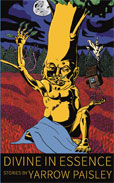
 |
This collection opens with “The Great Event,” a creatively horrifying tale of grisly dismemberment, ghostly hauntings, and disturbing obsessions. When maniacal devotion results in his wife Rhea’s untimely demise, Mr. Runcible engages in a twistedly gruesome act that binds Rhea’s essence to their home. As a result, the Runcible household is haunted by the specter of Rhea’s residual energetic resonance. Having lost his wife, Mr. Runcible transfers his unholy fascination to their daughter Helen, who lives a lonely, sheltered life of isolation where creativity is her sole companion. Indeed, it is Helen’s active imagination that enables her to perceive her home’s knocking pipes and explosive drains as communications from her dead mother. When Helen awakens from a prolonged illness, she finds her father apologetically exposed and her womb filled with new life. It is unclear whether Helen has been victimized or if the references to her innocence allude to immaculate conception. Either way, Helen gives birth to the world of dreams and, in so doing, ceases to exist as her very essence is utterly consumed. Out of Rhea’s grief over the loss of her daughter, a new world is born. With elaborate writing, a third-party omniscient narration style, and an irreverent tone, Paisley delivers a psychologically chilling creation story with a frighteningly unique concept of divinity.
Another standout in the book is “I In The Eye.” In this tale, a sullen, withdrawn seven-year-old boy experiences his first sexual attraction when introduced to his father’s new love interest, Clara Belle. The boy is mesmerized by creamy thighs, dangling breasts, and alluring perfume until he notices Clara Belle’s eerie blue glass eye with its unnaturally large pupil. As his previously unhappy, alcoholic father falls further and further under Clara’s laughing, dancing, gyrating spell, the young boy becomes aware of a shadow of himself existing in Clara Belle’s glass eye. Reminiscent of the Indigenous American belief that a photograph captures one’s soul, Clara repeatedly photographs the young boy with a disposable camera over the next few weeks. She then somehow uses the photos to trap the boy within her dead eye, subjecting him to a sleepless existence of forced silence. Locked within the confines of his glass prison, the young boy witnesses all manner of depravity and perversions. Told from the young boy’s perspective, this is a delightfully bizarre and wonderfully imaginative work of fiction. Well-written with well-developed characters and an entertaining storyline, this piece will leave readers fully invested in the story’s outcome.
Subsequent stories immerse readers in one unique, wickedly creative tale after the next. From a spine-chilling account of a mentally ill mother who feeds off her son to shapeshifting siblings, reanimated corpses, and a journey through the landscape of another’s mind, each short story reflects Paisley’s distinct writing style and imagination. With a bachelor of arts in literature from Bard College and multiple works included in journals and anthologies, Paisley is an accomplished, experienced writer who blends elements of horror, eroticism, suspense, tragedy, and fantasy. He uses literary devices such as narration from the point of view of inanimate objects, personification, complex metaphors, and descriptive writing to establish his distinctive voice as an author and produce an incredibly diverse collection of short stories.